Recent Articles
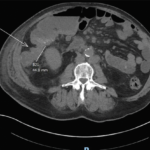
A Case Report
A Rare Case of Cutaneous Metastasis from Colon Cancer
Colorectal cancer remains the third most common cancer and second most common cause of cancer deaths, often from metastatic disease.1-6 While liver metastases are most common, other sites of metastases […]
Nutrition Reviews in Gastroenterology, SERIES #29
Nutrition Management for Functional Dyspepsia
Functional dyspepsia (FD) is a common disorder of the gut-brain interaction characterized by bothersome symptoms including postprandial fullness, early satiation, epigastric pain, and epigastric burning, without structural disease. Despite its […]
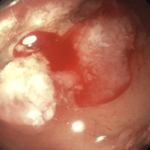
Frontiers in Endoscopy, Series #101
Topical Endoscopic Hemostatic Agents for Gastrointestinal Bleeding
Background Gastrointestinal bleeding (GIB) is associated with significant morbidity and mortality. Despite improved endoscopic practices for GIB, approximately 8-15% of patients fail primary endoscopic therapy, which includes injection, thermal, and […]
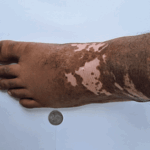
Liver Disorders, SERIES #20
Beyond Jaundice Part 2: Recognizing Dermatologic Findings in Chronic Liver Diseases
Chronic liver disease is often accompanied by cutaneous findings indicative of underlying pathology. However, in addition to the many widely-known and recognizable dermatologic manifestations, there exists a multitude of subtle, […]
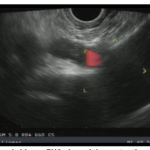
Frontiers in Endoscopy, Series #100
Pancreaticobiliary Endoscopic Ultrasound: How We Do It
Introduction Endoscopic ultrasound (EUS) has evolved into an indispensable tool in the evaluation and management of pancreaticobiliary diseases. Over 40 years ago, EUS was developed as a radial scanner, providing […]
Nutrition Reviews in Gastroenterology, SERIES #28
The Role of the Mediterranean Diet Pattern in Treatment and Management of Metabolic Dysfunction-Associated Steatotic Liver Disease
Metabolic dysfunction-associated steatotic liver disease (MASLD) is defined by excessive hepatic fat accumulation in individuals without significant alcohol intake. Previously termed non-alcoholic fatty liver disease (NAFLD), this condition included nonalcoholic […]
Special Article
Factors Predicting Patient Follow-Up in Clinic After Anorectal Manometry for Defecatory Disorders in a Community Hospital
Anorectal manometry (ARM) diagnoses anorectal sensorimotor disorders, and biofeedback therapy (BT) is an evidence-based treatment. We conducted a retrospective study at a community hospital to assess factors predicting patient follow-up […]
Liver Disorders, SERIES #19
Beyond Jaundice Part 1: Identifying and Describing Cutaneous Manifestations of Hepatitis and Cirrhosis
Dermatologic findings are common in liver disease, and may represent the very earliest or most prominent signs of an underlying disorder. While most practitioners recognize jaundice as a sign of […]
From the Pediatric Literature
Eosinophilic Esophagitis in Pediatric Patients Receiving Infliximab
The treatment of pediatric inflammatory bowel disease (IBD) has improved markedly with the use of biologic therapy which includes such medications as infliximab. Although infliximab has been used for some […]
Frontiers in Endoscopy, Series #99
Post-Sphincterotomy Bleeding: Incidence, Risk Factors, and Management
Introduction Endoscopic retrograde cholangiopancreaticography (ERCP) is a commonly used therapeutic procedure for diagnostic and therapeutic purposes for various pancreatic-biliary pathologies. Endoscopic sphincterotomy (ES) is a requirement for many biliary interventions. […]
Dispatches from the GUILD Conference, Series #71
Global Consensus Statement for the Management of Inflammatory Bowel Disease in Pregnancy: Implications for the Gastroenterologist
The management of inflammatory bowel disease (IBD) during pregnancy presents unique challenges, requiring a balance between maternal health, disease control, and fetal well-being. A global consensus conference, led by a […]
Liver Disorders, SERIES #18
Understanding New Nomenclature in Advanced Chronic Liver Disease
As understanding of disease processes in medicine evolves, terminology must often evolve too. Terminology related to cirrhosis has been changing to better capture the spectrum of liver disease and patients’ […]
Nutrition Reviews in Gastroenterology, SERIES #27
Gentler Solutions: Adapting the Low FODMAP Elimination Diet for Irritable Bowel Syndrome for Symptom Relief
Irritable Bowel Syndrome (IBS) is a common gastrointestinal (GI) disorder marked by abdominal pain, bloating, and altered bowel habits. Dietary changes are key to managing symptoms, with the low-FODMAP diet […]
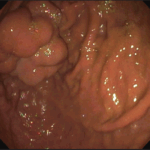
Frontiers in Endoscopy, Series #98
Endoscopic Ultrasound-Guided Therapy for Gastric Varices: Current Evidence and Emerging Perspectives
1. Introduction Gastric varices (GV) are a serious complication of portal hypertension, present in about 20% of cirrhotic patients compared to up to 85% with esophageal varices (EV).1,2 Though less […]
DISPATCHES FROM THE GUILD CONFERENCE, SERIES #70
Use of Beta-blockers in Patients with Cirrhosis
Non-selective beta-blockers improve outcomes in patients with cirrhosis and are recommended in(1) compensated cirrhosis and CSPH (to prevent decompensation), (2) decompensated cirrhosiswithout prior episodes of VH (to prevent first VH), […]
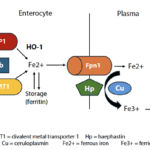
NUTRITION REVIEWS IN GASTROENTEROLOGY, SERIES #26
From Diagnosis to Treatment: Iron Management in Adults with Gastrointestinal Disorders
Iron deficiency anemia (IDA) affects about one-third of the global population and has a significant impact on individuals with gastrointestinal (GI) disorders. Its multifactorial etiology includes chronic inflammation, impaired nutrient […]
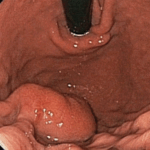
Frontiers in Endoscopy, Series #97
ROSE Versus MOSE for Evaluationof EUS – Guided Tissue Samples
Endoscopic ultrasound-guided fine-needle aspiration (EUS-FNA) with rapid on-site evaluation (ROSE) has been a subject of debate over the past few decades. With the development of new core needles, endoscopic ultrasound-guided […]
Nutrition Reviews in Gastroenterology, SERIES #25
Volume-Based Feeding’s Place in the Modern Intensive Care Unit
Underfeeding in the intensive care unit (ICU) is a well-documented issue affecting patient outcomes. Volume-based feeding (VBF) represents a feeding protocol designed to mitigate the effects of frequent enteral nutrition […]
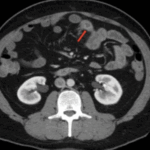
SPECIAL ARTICLE
Malignant Tumors of the Small Intestine: A Case Series and Review of the Literature
Small bowel neoplasms are uncommon gastrointestinal malignancies, but their incidence has risen in recent years. The main subtypes include adenocarcinoma and neuroendocrine tumors, each accounting for approximately 40% of cases, […]
DISPATCHES FROM THE GUILD CONFERENCE, SERIES #69
Taking Care of the Whole Patient with IBD: A Focus on Prevention and Health Maintenance for Primary Care Providers
Inflammatory bowel disease (IBD) is a chronic, immune-mediated disease characterized by intestinal inflammation and extraintestinal symptoms. The chronic and fluctuating nature of the disease, as well as side effects and […]

NUTRITION REVIEWS IN GASTROENTEROLOGY, SERIES #24
Selenium: A Micronutrientwith a Macro-Impact
Selenium, a naturally occurring trace element, serves many bodily functions through its role in a family of proteins called selenoproteins. The average daily intake in the United States is about […]

Frontiers in Endoscopy, Series #96
Role of EUS and ERCP in Diagnosis and Management of Idiopathic Pancreatitis
Introduction Gallstones/choledocholithiasis and alcohol use/abuse are the most common causes of acute pancreatitis (AP).1 When the cause of acute pancreatitis remains unidentified despite a thorough history, physical examination, laboratory tests, review […]

FELLOWS’ CORNER
Superior Mesenteric Artery Syndrome
by Archit Garg, Lara Calegari A 35-year-old Hispanic woman, who had endometriosis surgery in 2018, experienced worsening epigastric pain, severe nausea, vomiting, and diarrhea for one day. The patient had […]

Dispatches from the GUILD Conference, Series #68
Eosinophilic Esophagitis: Tips for the Primary Care Provider
Eosinophilic esophagitis (EoE) is a chronic allergic clinicopathologic condition with a rapidly increasing incidence and prevalence and is being increasingly seen in both specialty and primary care settings. Left untreated, […]
Nutrition Reviews in Gastroenterology, SERIES #23
Kidney Stones in Short Bowel Syndrome: Causes and Preventive Measures
Short bowel syndrome (SBS) occurs from either surgical resection or malfunction of a significant amount of small bowel. An estimated 42-50% of patients with SBS will develop kidney stones in […]
From the Pediatric Literature
Intestinal Ultrasound Use in Pediatric IBD
Pediatric inflammatory bowel disease (IBD) in children requires endoscopic intervention for initial diagnosis and for continued disease surveillance. Intestinal ultrasound (IU) has the potential to be less invasive while also […]

FRONTIERS IN ENDOSCOPY, SERIES #93
Ablation of the Gastric Cardia for GERD: A Comprehensive Technical and Clinical Review
Anti-Reflux Mucosal Ablation (ARMA) is an innovative endoscopic intervention for managing PPI-refractory GERD by enhancing the structural integrity of the gastroesophageal junction (GEJ). Utilizing controlled thermal ablation, ARMA induces localized […]
Dispatches from the GUILD Conference, Series #67
What do Gastroenterologists Need to Know About Stomas?
Intestinal stomas, whether from the small or large bowel, are the cornerstone of the surgical management of various gastrointestinal conditions, particularly in patients with inflammatory bowel disease (IBD) and rectal […]
Nutrition Reviews in Gastroenterology, SERIES #22
Nutrition Therapies for Managing Gastrointestinal Symptoms During Pregnancy
Gastrointestinal symptoms of pregnancy are common and can interfere with quality of life and the ability to consume adequate oral intake. The occurrence of symptoms varies throughout pregnancy; while nausea […]

A CASE REPORT
Granulomatosis with Polyangiitis Presenting as Crohn’s Disease
by Eliseo Garcia, Kurt B. Schaberg, Angel A. Herrera Guerra, Arthur J. de Lorimier Granulomatosis with Polyangiitis (GPA) is a systemic necrotizing vasculitis associated with antineutrophil cytoplasmic antibody (ANCA) that […]

Dispatches from the GUILD Conference, Series #66
Diagnosis and Managementof Gastroparesis
This review appraises the symptoms associated with gastroparesis and the optimal measurement to identify delayed gastric emptying. The diagnosis requires differentiation from functional dyspepsia, iatrogenic disease (e.g., opiates and GLP-1 […]
Dispatches from the GUILD Conference 2025
Introduction: Dispatches from the GUILD Conference 2025
Welcome to the ninth annual Dispatches from the GUILD Conference series. The Gastrointestinal Updates-IBD-Liver Disease (GUILD) Conference is an annual CME conference held in Maui, Hawaii every February (GUILD 2025: […]

Frontiers in Endoscopy, Series #94
Endoscopic Management of Esophageal and Gastric Anastomotic Strictures
Introduction Esophageal and gastric anastomotic strictures can be challenging to treat. Minimally-invasive therapeutic endoscopic intervention has overtaken surgical re-intervention as first-line therapy. This literature review aims to assess the technique, […]
 Sophia Scattaglia
Sophia Scattaglia Nancee Jaffe
Nancee Jaffe Magnus Chun
Magnus Chun Douglas G. Adler
Douglas G. Adler Olivia Babich
Olivia Babich Alexandra Savage
Alexandra Savage Jennifer L. Maranki
Jennifer L. Maranki Alexander W. Worix
Alexander W. Worix Jennifer C. Lai
Jennifer C. Lai Neha D. Shah
Neha D. Shah Misha Gautam
Misha Gautam Utkarsh Goel
Utkarsh Goel Abbas Bader
Abbas Bader Vinay Jahagirdar
Vinay Jahagirdar Esmat Sadeddin
Esmat Sadeddin Hassan Ghoz
Hassan Ghoz Archit Garg
Archit Garg Arushi Kohli
Arushi Kohli Uma Mahadevan
Uma Mahadevan Cierra Smith
Cierra Smith Michael Babich
Michael Babich Kate Scarlata
Kate Scarlata Khyati Bidani
Khyati Bidani Nicolas Chong Lugon
Nicolas Chong Lugon Guadalupe Garcia-Tsao
Guadalupe Garcia-Tsao Sasathorn Thongkhao-On
Sasathorn Thongkhao-On Holly Estes-Doetsch
Holly Estes-Doetsch Kristen M. Roberts
Kristen M. Roberts Janine Wong Berta
Janine Wong Berta Daniel Kurtz
Daniel Kurtz Sharon Slomovich
Sharon Slomovich Mahnoor Khan
Mahnoor Khan Neal Shah
Neal Shah Frank G. Gress
Frank G. Gress Nichole C. Henkes
Nichole C. Henkes Chasen H. Cottle
Chasen H. Cottle Jami A. Kinnucan
Jami A. Kinnucan Sebastian Dobrow
Sebastian Dobrow Rangesh Modi
Rangesh Modi Parth Patel
Parth Patel Evan S. Dellon
Evan S. Dellon Melanie Betz
Melanie Betz Sheza Malik
Sheza Malik Gilad Alon
Gilad Alon Michael Goldenshluger
Michael Goldenshluger Stefan D. Holubar
Stefan D. Holubar Miguel Regueiro
Miguel Regueiro Christine L. Scarcello
Christine L. Scarcello Kelly Issokson
Kelly Issokson Puja V. Khanna
Puja V. Khanna Michael Camilleri
Michael Camilleri Michael B. Andrews
Michael B. Andrews